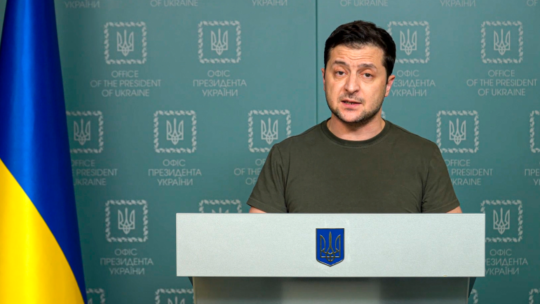
In 2022, war plays out on screens differently than in the past. In 1991, many television viewers saw international conflict displayed for the first time, in real time, via CNN, during the Gulf War. Missiles lit up the skies of Baghdad, Iraq, through a grainy, green night-vision lens.
Today, war is seen through social media and citizen accounts. Many may recall Twitter's role during the Arab Spring uprising, in 2011. We’ve seen first-person accounts posted from demolished cities in Syria, and, most recently, pleas for help from Afghanistan.
The Russian invasion of Ukraine has shown us a whole other level of social media use. Because of upgrades in cameras and video editing apps on phones, the world is seeing first-person accounts of war in real-time from Ukrainian citizens, including bombings and interactions with soldiers.
“The technology and the inability of aggressor governments to shut down the communications of a People means the western world is watching in the most transparent way, maybe in human history, what war looks like,” says John Guilfoil, founder, JGPR.
One of the most powerful messages followers have received comes from the Ukrainian president. Social media allows Volodymyr Zelenskyy live, direct access to his people and international leaders in a way many haven’t seen before.
Ukrainian President Zelenskyy:
“We’ve hardly slept for 7 nights … The time will come when we’ll be able to sleep, but it’ll be after the war, after the victory.” pic.twitter.com/cqf8SNlqEr
— The Recount (@therecount) March 2, 2022
Zelenskyy posts updates from bunkers with fellow soldiers. Images show him participating shoulder-to-shoulder on the front lines. He delivers impassioned, transparent, authentic speeches encouraging citizens and asking for support. Zelenskyy is winning the information war—his popularity spreading across the globe, along with support for Ukraine.
I nominate this guy for Time's Person of the Year #Zelenskyy pic.twitter.com/emyhr0xjOH
— Pete Tran (@pit5000) February 27, 2022
“There simply is not another example in the western world of this, so there’s no precedent for it,” Guilfoil says about the communication delivery. “The quote 'I don’t need a ride, I need ammunition' will live in hearts, minds and Ukrainian history forever.”
Good Crisis PR Gets Results
From a news-and-information delivery perspective, President Zelenskyy and the Ukrainian people are conducting a master class in the utilization of modern communication tools to inform the public about crisis. And the proof is showing in the magnitude of actionable results.
“What Ukraine has done through one of the most effective government public relations programs ever is to unite the majority of the world, and rally often-reluctant leaders to their cause,” Guilfoil says.
“FIFA was late to react, but the continuous international pressure made them change course. So we’re seeing in sports, entertainment, business, and culture—organizations that don’t necessarily want to be involved are finding themselves brought in and having to react accordingly.”
Lessons from the Front
And technology is only one bullet point in Ukraine's communication push. TV towers and satellite signals get targeted because Russia knows the power of communication.
“Actual words still matter,” Guilfoil says. “Zelenskyy was on a video call with other European leaders, most of whom had not yet agreed to help him...He told them that he was the target, and his family was the second target, and this would probably be the last time they saw him alive. Within hours he had help. Germany reversed a decades-long policy. Sweden, Finland. The Swiss paused neutrality. It’s the words at the end of the day aided by the technology.”
Linnea Labs, PR executive at Pearl Lemon PR, says it’s important during a struggle for a leader to show resilience.
"Zelenskyy is being brave,” Labs says. “A strong, capable leader is going to give hope to the people. Choosing to stay [in Ukraine] is not something everyone would do, but it definitely gives a lot of reason to support him."
Involvement of Public Figures
It seems as though everyone has an opinion about the war, although some may not be as forthcoming as others. Some remain silent.
Still, fans of Russian and Ukrainian athletes, entertainers and others are clamoring to know what these public figures think.
Just ask future NHL Hall-of-Famer Alexander Ovechkin. The Washington Capitals star and past supporter of Vladimir Putin took a middle road when answering questions about the invasion. Replying with "Please, no more war. It doesn't matter who is in the war—Russia, Ukraine, different countries—we have to live in peace.”
Some journalists, fans and a former player did not find this answer satisfying, considering Ovechkin’s popularity in Russia and ties to Putin. Writer James Dator at SB Nation called him a “sycophantic coward.”
The Guardian says Ovechkin can “hit Putin where it hurts.” MassMutual pulled an ad featuring the hockey star March 1.
Labs says while it's easy to point fingers, people should not “rush” a response—take time and consider words, “carefully.” She says every public figure should first consider if it’s appropriate to comment.
“This can be difficult to assess sometimes,” she says. “If you're a political figure, you should...but no matter what side you choose or what perspective you take, always remember to have empathy.”
Labs adds another point about empathy. The Russian invasion is a serious world event where people are losing their lives daily. “Understand that people are grieving,” she says. “They're not going to respond in a predictable manner. Simply saying anything could very well set someone off, and not saying anything can also say a lot.”
And while not every situation is as simple as praising one side and condemning the other, Labs says the right path comes with authenticity.
“If you're honest in the assessment you give, and you show respect where necessary, then that is going to be positive. But timing is also very important.”
Nicole Schuman is senior editor for PRNEWS. Follow her @buffalogal
